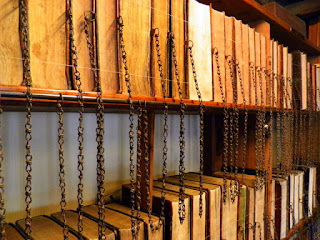 |
|
The renovated Langsdale Library could feature
a copy Bill Woodrow’s Sitting on History sculpture that is in front of the British Library via Wikimedia Commons [CC BY 3.0] |
At the beginning of The Internet of Us: Knowing More and Understanding Less in the Age of Big Data, author Michael Lynch asks his readers to imagine a hardly far-fetched future where everyone has a neuro-implant that allows them to access information from the internet by their thoughts alone. He raises an issue previous expressed by others, such as Nicholas Carr in The Shallows, that as our society gets so immersed in digital culture, we could lose the ability to think about and solve problems in different ways. Lynch goes on to imagine what would happen if an ecological disaster were to take down the network of this world where people had no experience with other ways of “knowing” things. He thinks it would be just as catastrophic as if everyone went blind.
At Langsdale, this naturally got us thinking about the role libraries play in the way people access information and develop knowledge. While much of the digital resources that can be accessed through Langsdale are things like scholarly journal articles that can’t be fully understood without investing the time to read and consider them carefully, we do provide almost all of them solely in digital format. So that begs the question of what might happen in the event of a disaster, such as a Zombie Apocalypse. OK, so obviously the Zombies part is a joke meant to make the material more engaging, but that link goes to CDC website with lots of great suggestions about what to do in an actual emergency. However, the useful information there would be completely unavailable if there were a massive disruption to the power grid. If a calamity were to happen, how would people get the information they need, especially when time may be of the essence?
In response to this conundrum, Langsdale is proposing that the 2nd and 3rd floors of the renovated library building be dedicated to housing the essential books and documents of our generation. While that is a good first step, in order to ensure that this material would be available in the event of a disaster, Langsdale is going to have to change some of its operating procedures. For instance, we can’t have someone borrowing an important book and risk that it won’t be available when it is crucially needed. Plus, if the power goes down, our current system would not even be able to detect if someone were trying to sneak a book out of the library without checking it out.
 |
|
An artist’s drawing of a bookcase like the ones that
could be used in Langsdale. Bookcase in Hereford
Cathedral [Public domain], via Wikimedia Commons |
Fortunately we already know how to deal with these problems, because libraries in the time before the printing press – when it wasn’t easy to make copies and books were very valuable – already figured it out. The renovated Langsdale will be become the latest in the growing trend of modern libraries that feature books chained to the shelves. Table-desks will be connected to the bookcases so people will be able to sit comfortably and read the books next to the shelves. Although this sounds like it would be expensive, since the new library will no longer need the electronic systems designed to circulate books and deter thefts, the net impact on the budget is negligible.
Historians have pointed out that in these chained libraries, books needed to be shelved with their spines facing inward, so that the chains did not become tangled when a book was taken off the shelf. In preparation, Langsdale staff has started inscribing the call numbers along the outside of the books, so that people will be able to find the items they need quickly and easily once the renovation is complete.
The basement of Langsdale, which sits below ground level, seems like an ideal place to congregate in a disaster, so we will be stocking the basement with lots of paper and pencils. Anyone there will be able to go up to the floors with the books and copy all of the pertinent information from them as needed. There was some concern that chaining the books would prevent students from being able to check them out or even make copies of them during times when we did not have an active emergency. However, recent surveys indicate that most students own a smart phone upon which they could download and free scanning app. So we assume that students will be able to use those to make any personal copies they might need. Within the parameters of copyright law, of course.
 |
| Langsdale’s books could be shelved this way in the not too distant future. Wimborne Minster: the chained library © Chris Downer [CC BY 2.0] |
Thanks for reading and enjoy the rest of this fine April day.